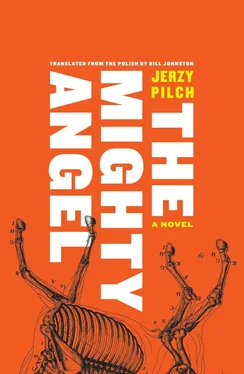I was sorely tempted to say in a superior tone of voice, with scant regard for the truth, that urological advice was not the same thing as literature, but I restrained myself. It wasn’t right, either for respectable polemical purposes, or in defense of one’s métier, or even in self-defense, to speak an untruth: urological advice was capable of being great literature.
Besides, in one sense Kasia was right: I no longer wanted to be only a writer, now I wanted to be only with you. But since no one, neither Kasia, nor the therapist Moses alias I Alcohol, nor Dr. Granada, nor the Lord God himself has forced me to choose between you and literature, I’m still writing, though now I do it discreetly. If on the other hand the Lord God had spoken to me through the mouth of Kasia the she-therapist and He had been the one forcing me to choose between alcoholism and literature, between treating alcoholism or writing a book, I would have curled up in humility, but I would have said: “Lord, you’ve chosen too frail a messenger, too frail a messenger to convince such a hardened toper as myself.”
Kasia the she-therapist looked at me searchingly, but I withstood her gaze. As the time passed she relaxed visibly, while I relaxed invisibly (though the reverse ought to have been the case). I raised my head and she lowered her head and said in an extremely quieted voice:
“In any case, neither I nor anyone else is going to check your manuscripts.”
About that I had no worries. When the posse of she-therapists conducted a spot check of some alco’s bedside table it was exclusively in search of spirit in a toothpaste tube, Żołądkowa Gorzka in a shampoo bottle, valium hidden in a shoe. Anti-alcoholism books and brochures, questionnaires, written assignments, confessions and emotional journals flew through the air; the alcoholics’ tattered notebooks, which contained not a single drop of alcohol, were of no interest to anyone. But of course the very fact that anyone at all should presume to speak of checking or not checking my papers aroused my utmost disgust, and I decided to pursue my writing with discretion.
Then, when in the course of a group session on the topic “How I have explained and justified my drinking,” when in the course of this session one of the she-therapists (never mind her name) snatched my notebook from me and started peering at what I had written, I decided — just in case — to go completely underground. I intensified my time-consuming discretion to the point where it took on a conspiratorial quality.
I get up at four in the morning. Mist is rising from the gardens of the insane; I slip surreptitiously into the quiet room and surreptitiously begin to write. On Sunday, the completed manuscript under my arm, I wait by the hospital gates. Around eleven o’clock you run down the platform; we walk along our path and sit on the stone bench by the Utrata River. In the late afternoon you smuggle my latest chapter safely past the guards minding the gates. You get into a local WKD train and ride to Centralny Station; there you transfer to an InterCity express, there you are safe already. (Years ago, or maybe only a few months ago, I almost sensed it: you were two hundred miles from here.) Now it’s evening; darkness enfolds the alco wing. I sit on my bed in the five-person room and read your letters. You sit in your compartment, and were it not for the fact that you’re very close, I would say sentimentally: you’re further and further away. But no: she’s there. She’s sitting by the window, watching the distant flat plain passing by; on her lap (her green summer slacks are almost completely dry now) she smoothes out the poor-quality squared notepaper and reads with ease the shaky handwriting: “Shivers zigzag through our bodies. We’re sitting on a stone bench by the Utrata River. I say: The Mill on the Utrata; you say: The Mill on the Lutynia. .”
Chapter 24. Simon’s Undescribed Escape
NIGHT HAS FALLEN over the alco ward. The routed army lies side by side, the hallway lit by a single bulb; they are sleeping. (One of them, however, is not sleeping; he sees freedom beyond the mist.) Simon Pure Goodness wakes from a shallow, vigilant doze, gets up, takes a canvas bag from under his bed and soundlessly, so as not to rouse his sleeping roommate, starts to pack. Simon Pure Goodness does not like his sleeping roommate. He struggles with this feeling, constantly repeating “love thine enemy” to himself, constantly reminding himself of the twelve steps of Alcoholics Anonymous; but hostility is in his heart. His sleeping roommate snores, and Simon cannot sleep at nights. Simon’s sleeping roommate borrowed ten zloties from him, and Simon knows he will never see the money again, though now especially, when he has decided to escape, every penny would be worth its weight in gold. Simon’s sleeping roommate uses Simon’s cigarette lighter and pen without asking, and Simon lacks the inner strength to bring this up with him. The other man, however, has no qualms about reminding Simon to close his cabinet and to sweep the room properly when it’s his turn. At such moments Simon not only has hostility in his heart, he becomes the very embodiment of hostility.
“What is hostility?” asked the therapist Moses alias I Alcohol in one of his talks. “What is hostility?” he repeated, and when the silence in the lecture theater became unbearable he presented, and subsequently dictated, the definition of hostility to the forlorn alcos. “Hostility,” wrote the half-dead army in sluggish unison, “hostility is rage,” wrote Simon along with all the others, “hostility is rage directed against someone or something.” Simon read the definition he’d written down in a cheap sixty-page notebook; his mind cleared, and he suddenly felt uneasy. In Simon’s opinion, if he had been able to express his opinion, an excessive clarity of mind leads to nervous disorders. To know something fully means not to have any reserves of knowledge on a given subject, and when a person has no reserves they feel foolish; at such times a person feels as if they were about to run out of cigarettes. Not “a person” but I Simon, not “they” but I Jerzy. And not “feels,” but “drinks. .”
•
Could the cute young she-therapist Kasia have been right? Was it actually possible I no longer felt like writing about drinking? Or maybe I no longer felt like writing because I no longer felt like drinking? As I wrote I was trying to keep up with my writing about drinking and with my giving up drinking, and I lost the chase, or maybe I won the chase? Or maybe the same thing happened to me that happened to Marcel Proust? Pourquoi pas? Warum nicht? Pochemu nyet ? In Proust — an interpretation I remember from Professor Błoński’s lectures twenty-eight years ago — in Proust then, the lost time of the hero is the recovered time of the narrator. With me it’s almost the same: I, Jerzy the narrator, am not only recovering the lost time of the Drunkard protagonist, I’ve also found the thing he has been looking for in vain from the very first sentence. On the way I’m recovering the wasted, drunk-away time of the other characters. Between myself and my characters there are at times very few differences. (There’s no contradiction here with what is said elsewhere in this epic poem.) Between myself and myself there are also only a few subtle distinctions; because of this it may even be the case that the Drunkard is the narrator, while Jerzy is searching in vain for a last love before death, and when it comes down to it they are interchangeable.
In other words not Don Juan the Rib but I Don Juan the Rib. Not Dr. Granada but I Dr. Granada. Not Nurse Viola but I Nurse Viola. Und so weiter .
I don’t speak any foreign languages, but the she-therapists exert such a profound influence on me that I sometimes have the feeling that any minute now I’m going to start speaking foreign languages. My German, sent to sleep in my childhood, will awaken; my schoolboy Russian will grow khorosho in both spoken and written form; my never properly learned English will become proper. Speaking in tongues would not be the strangest thing to happen on the alco ward.
Читать дальше












